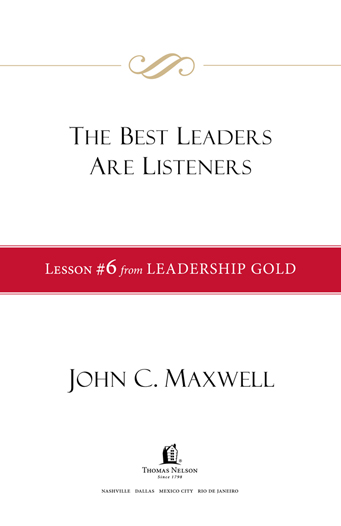
2008, 2012 by John C. Maxwell
This ebook is derived from Leadership Gold, by John Maxwell, 2008, 2012 by John C. Maxwell.
All rights reserved. No portion of this book may be reproduced, stored in a retrieval system, or transmitted in any form or by any meanselectronic, mechanical, photocopy, recording, scanning, or otherexcept for brief quotations in critical reviews or articles, without the prior written permission of the publisher.
Published in Nashville, Tennessee, by Thomas Nelson. Thomas Nelson is a registered trademark of Thomas Nelson, Inc.
Published in association with Yates & Yates, www.yates2.com.
Thomas Nelson, Inc. titles may be purchased in bulk for educational, business, fund-raising, or sales promotional use. For information, please e-mail SpecialMarkets@ThomasNelson.com.
ISBN: 978-0-7852-1411-3 (hardcover)
ISBN: 978-1-4185-7113-9 (ebook)
ISBN: 978-1-4002-7540-3 (ebook of chapter 6)
CONTENTS
DEDICATION
Leadership Gold is dedicated to Ella Ashley Miller, our fourth
grandchild. Her gentle nature continually draws us to her. We pray that
as she grows older she will mine the gold out of the lessons of life.
Thank you to
Charlie Wetzel, my writer
Stephanie Wetzel, who proofs and edits the manuscript
Linda Eggers, my assistant
THE BEST LEADERS
ARE LISTENERS
Steven Sample, in his book The Contrarians Guide to Leadership, writes, The average person suffers from three delusions: (1) that he is a good driver, (2) that he has a good sense of humor, and (3) that he is a good listener. I plead guilty on all three counts!
I will never forget the time a lady I worked with confronted me about my poor listening skills. She said, John, when people talk to you, often you seem distracted and look around the room. Were not sure that you are listening to us!
I was surprised because, like most people, I really did think I was a good listener. The first thing I did was apologize. I trusted the opinion of the person who had confronted me, and I knew it had taken courage for her to tell me. (I was her boss.) The second thing I did was start trying to change. For several years I made it a regular practice to put an L in the corner of my legal pad anytime I was in a meeting to remind myself to listen. Sometimes I would write LL to remind myself to look at them while I listened. It made a big difference in my leadership.
Steven Sample says, Many leaders are terrible listeners; they actually think talking is more important than listening. But contrarian leaders know it is better to listen first and talk later. And when they listen, they do so artfully.
The positive benefits of being a good listener are much more valuable than we often recognize. Recently I read a humorous story that Jim Lange included in his book Bleedership.
A couple of rednecks are out in the woods hunting when one of them falls to the ground. He doesnt seem to be breathing and his eyes are rolled back in his head.
The other guy whips out his cell phone and calls 911.
He frantically tells the operator, Bubba is dead! What can I do?
The operator, in a calm, soothing voice says, Just take it easy. I can help. First, lets make sure hes dead.
There is silence, and then a shot is heard.
The guys voice comes back on the line and says, Okay, now what?
As this story about rednecks illustrateswe can hear what is said without really listening to what is being communicated. The hunter above heard what the operator told him and technically did make sure that his hunting companion was dead. But had he really been listening, I dont think he would have shot his partner.
The story may seem silly, but it contains an important truth. When we hear without really listening, our leadership is bound to sufferand so will our followers.
I once read about a study that stated that we hear half of what is being said, listen to half of what we hear, understand half of it, believe half of that, and remember only half of that. If you translate those assumptions into an eight-hour work day, here is what it would mean:
 You spend half your dayabout four hoursin listening activities.
You spend half your dayabout four hoursin listening activities.
 You hear about two hours worth of what is said.
You hear about two hours worth of what is said.
 You actually listen to an hour of it.
You actually listen to an hour of it.
 You understand only thirty minutes of that hour.
You understand only thirty minutes of that hour.
 You believe only fifteen minutes worth.
You believe only fifteen minutes worth.
 And you remember less than eight minutes of all that is said.
And you remember less than eight minutes of all that is said.
Thats a pretty poor track record. And it shows that we all need to work much harder at actively listening!
WHY LISTENERS ARE MORE EFFECTIVE LEADERS
Because of my desire to be a more effective listener, I have actively observed leaders for years and paid close attention to how the effective ones listen to others. And I have come to some conclusions about the impact of good listening related to leadership.
1. Understanding People Precedes Leading Them
Leadership finds its source in understanding. To be worthy of the responsibility of leadership, a person must have insight into the human heart. Sensitivity toward the hopes and dreams of people on your team is essential for connecting with them and motivating them. In my book The 21 Irrefutable Laws of Leadership, I write about the Law of Connection, which states, Leaders touch a heart before they ask for a hand.You cannot connect with someone if you dont try to listen to and understand them. Not only is it not fair to ask for the help of someone with whom you havent connected, it is also ineffective. If you want to be more effective connecting with people, make it your goal to understand them.
2. Listening Is the Best Way to Learn
It is no accident that we have one mouth and two ears. When we fail to listen, we shut off much of our learning potential. Youve probably heard the phrase seeing is believing.Well, so is listening. Talk show host Larry King said, I remind myself every morning: nothing I say this day will teach me anything. So, if Im going to learn, I must do it by listening.
In 1997 we moved to Atlanta, Georgia. Immediately I realized the influence of the African American community upon that city. I wanted to connect with people in that community and learn about their journey. I asked my friend Sam Chand to set up four lunches with some top African American leaders. For me, it was one of the greatest learning experiences of my life. Our time together was filled with our getting acquainted, my asking questions, and my listening to wonderful stories. I left each lunch with new friends and greater respect for the people I met and for their life experiences. Many individuals expressed their surprise to me that with my leadership experience, I did not try to teach them about leadership, but that I was the student and they were the teachers. If I had done that, I wouldnt have learned anything. Today I am still listening to and learning from many of the leaders who became my friends at those lunches.
3. Listening Can Keep Problems from Escalating
A Cherokee proverb says, Listen to the whispers and you wont have to hear the screams. Good leaders are attentive to small issues. They pay attention to their intuition. And they also pay close attention to what
Next page
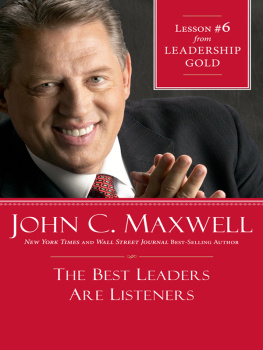
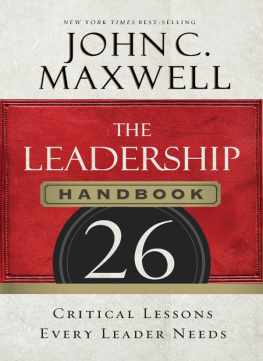
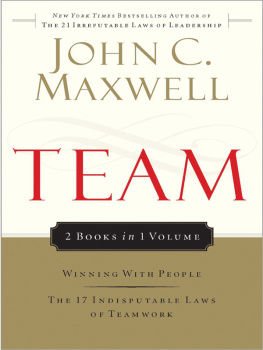
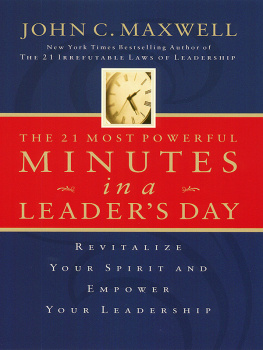




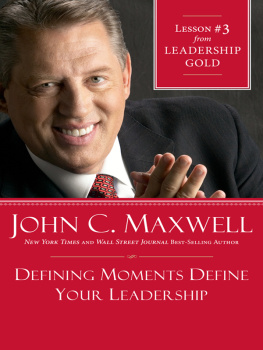
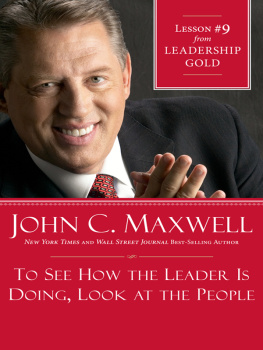

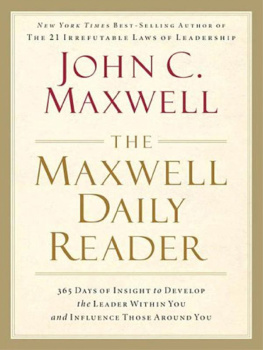
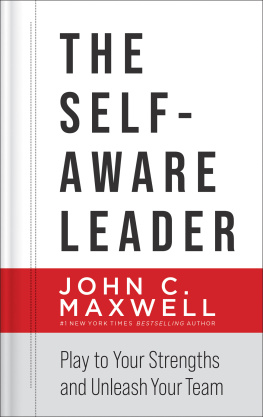
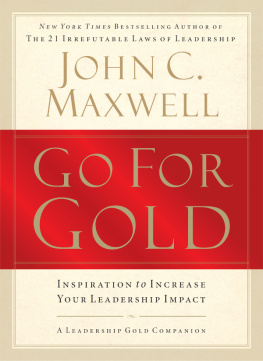
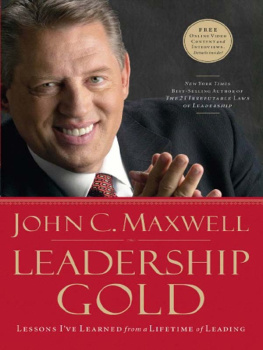
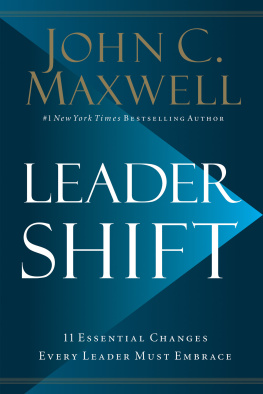
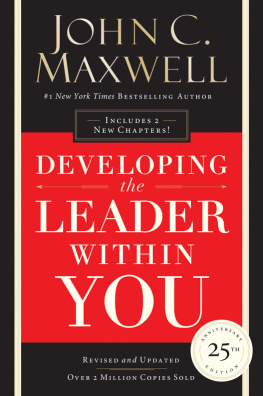
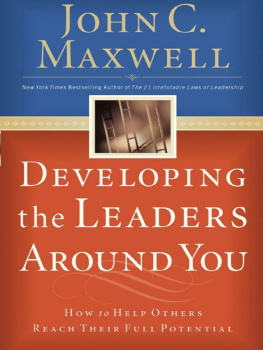

 You spend half your dayabout four hoursin listening activities.
You spend half your dayabout four hoursin listening activities.